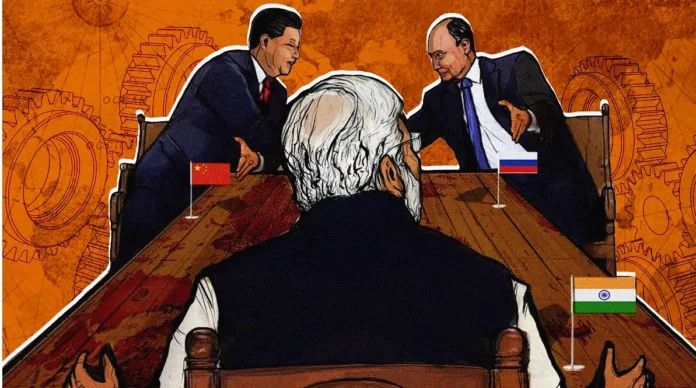✍ Dr. Shujaat Ali Quadri – India
India has long positioned itself as a key voice in multilateral forums representing the Global South. Institutions like BRICS and the Shanghai Cooperation Organization (SCO) have historically offered New Delhi strategic space to push multipolarity, reform global governance, and counter Western dominance. However, with recent geopolitical shifts and internal contradictions within these platforms, the question arises: Is India losing influence in multilateral institutions like BRICS and SCO? Erosion of Balance in BRICS
BRICS was once celebrated as a counterbalance to Western institutions like the IMF and World Bank. India, with its growing economy and democratic model, played a central role in shaping BRICS’ early agenda especially in financial reforms, development banks, and digital governance.
However, the expansion of BRICS in 2023, which brought in six new members including Iran, Egypt, and Saudi Arabia, has skewed the balance of power within the grouping. Critics argue that this expansion, largely pushed by China and Russia, tilts the organization towards an anti-Western posture, diverging from India’s strategic autonomy and multi-alignment goals.
India, which has historically advocated for issue-based cooperation within BRICS, now finds itself among members that are either authoritarian or heavily aligned with China or Russia. This may dilute India’s influence, particularly when consensus-based decisions are replaced by bloc politics. Moreover, India’s hesitation and lack of enthusiasm about the BRICS expansion reflected its concern about the organization losing focus and turning into a China-led alliance.
China’s Overbearing Presence
India’s challenges in BRICS and SCO are largely tied to the growing assertiveness of China. Since the Galwan clash in 2020, bilateral tensions between India and China have spilled into multilateral forums. Despite formal diplomatic ties within BRICS and SCO, the shadow of geopolitical rivalry affects coordination.
China’s dominance in the BRICS New Development Bank (NDB) and its push for yuan-based trade settlements highlight its intent to shape the grouping’s financial and strategic direction. While India remains a founding member, its role has often been reactive rather than proactive in steering the BRICS economic agenda. In contrast, China has aggressively used these forums to amplify its Belt and Road Initiative (BRI), a project India outrightly rejects.
In SCO too, the China-Pakistan nexus challenges India’s space. Pakistan’s entry into the SCO, facilitated by China, has made the grouping more complicated for New Delhi. Despite India being a full member since 2017, its ability to push anti-terrorism concerns or connectivity issues has been repeatedly blocked or diluted by Pakistan and China.
SCO: A Platform of Limited Utility?
India’s engagement with the SCO has always been pragmatic. Initially conceived as a security bloc focused on Central Asia, India viewed the SCO as a gateway to deepen ties with energy-rich Central Asian nations and enhance counter terrorism cooperation.
However, India’s actual gains remain modest. The Central Asian Republics continue to be more integrated with Russia and China than with India. India’s “Connect Central Asia” policy has not delivered strategic depth, largely due to lack of direct land connectivity (blocked by Pakistan), bureaucratic delays, and minimal economic presence.
Furthermore, India’s presidency of the SCO in 2023 was a litmus test. While it hosted the summit virtually and emphasized themes like digital inclusion and counter terrorism, the outcomes remained largely symbolic. The inability to forge consensus on regional security mechanisms or connectivity projects points to the limited maneuvering space India enjoys within the SCO.
Strategic Autonomy vs. Bloc Politics
India’s core foreign policy tenet strategic autonomy puts it at odds with both Western and Eastern blocs. While India is part of BRICS and SCO, it is also a member of Quad (with the US, Japan, and Australia) and engages actively in G20, I2U2, and other Western-oriented platforms.
This dual alignment has, at times, made India appear hesitant or non committal in forums like BRICS and SCO. For example, while China and Russia often push anti US rhetoric in these institutions, India avoids aligning with such positions. This nuanced stance, though principled, may appear as passive diplomacy in highly polarized global settings.
India’s refusal to endorse BRI, its border disputes with China, and its push for reforming global multilateralism without undermining the UN framework, create tensions with countries that use BRICS/SCO as platforms for alternative world order advocacy.
India’s Way Forward
Rather than abandoning these forums, India appears to be recalibrating its role. It uses BRICS and SCO as platforms to voice the concerns of the Global South, pitch itself as a development partner, and promote multipolarity but not at the cost of its national interests or values.
India’s presidency of the G20 in 2023 demonstrated its ability to lead global consensus amid deep divisions. It will now seek to leverage that success to bolster its position within BRICS and SCO by promoting practical, development-oriented agendas, rather than ideological alignments.
India is not entirely losing influence in multilateral institutions like BRICS and SCO but its relative space for leadership is shrinking due to internal contradictions, China’s assertiveness, and a shift in global alliances. If India wants to remain a pivotal voice, it must deepen strategic partnerships with like minded countries within these blocs, offer viable alternatives to China-led narratives, and showcase its capability to be a constructive global player.
A careful mix of pragmatism, assertive diplomacy, and clear red lines will determine whether India continues to shape the agenda or merely reacts to it in multilateral platforms going forward.
